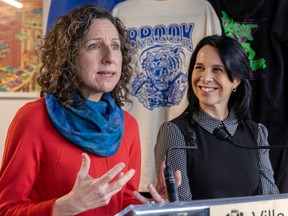Article content
Toby Bouchard said it has cost him just a few cents to comply with the city’s ban on some single-use plastics.
“It really wasn’t a problem,” said Bouchard, owner of Brook Coffee Shop and Pizzeria on Wellington St. in Verdun. “I simply went to the same supplier and they gave me cardboard containers to replace the plastic ones I bought. It was a little more expensive. The lid of the coffee cups costs only two cents difference.”
Article content
Bouchard said that because of the small price difference he has no problem with the statute, which went into effect a year ago.
On Monday, the city highlighted the success of the ordinance, which bans certain plastic materials and requires restaurants to offer reusable cutlery for dine-ins and bamboo cutlery for takeout. It also prohibits plastic cups, straws and stir sticks, and those caught offering the products can be fined between $400 and $4,000.
The city’s team of 32 inspectors visited approximately 9,000 of the 9,500 businesses affected by the ban during the year and recorded a compliance rate of 92 percent, said Marie-Andrée Mauger, a member of the city’s executive committee in charge of the ecological transition. Those who did not comply received a second visit and, if they still did not comply, they were fined. Fewer than 40 fines were issued after those second visits, Mauger said.
He added that Bouchard’s experience is consistent with the city’s assessment that switching to more environmentally friendly options would not cost the end consumer much more.
Article content
“We estimate that in 2021 it would be five to ten cents per order,” Mauger told reporters while standing alongside Bouchard and Montreal Mayor Valérie Plante at Brook.

Mauger said the city has not yet totaled the amount of trash sent to landfills in 2023, but a five percent decrease was already seen last year.
He admitted that the statute is not perfect because, although cups sold for single use are now recyclable, many still end up in trash cans. They are also often not recycled, even if thrown into public recycling bins, because most have non-recyclable material mixed in and are rejected at recycling plants.
Those who really want to recycle the cups should bring them home and place them in their own recycling bins, but Mauger said the real solution is to avoid buying a paper cup in the first place.
“We should really move more toward reusable cups,” he said.
Plante said she is proud of the city’s ban on single-use plastics and said she would like to see a province-wide ban come into effect to make it more widespread.
“Montreal did it and other cities have done it too; I think all of Quebec should now ban these plastics as well,” she stated. “There are suppliers, there is interest.”
In response to the city’s announcement, Karel Ménard, executive director of the Quebec coalition for ecological waste management, was pleased with the companies’ compliance rate.
“It’s a start,” Ménard said. “We have to act step by step. Imagine if we banned all single-use products immediately, there would be a revolution. But we have to get people used to this and make them understand why it is important to reduce the consumption of single-use plastics.
“We can’t solve all the problems in one year, but maybe in six or ten years we will no longer have single-use plastics. I hope the next step is a provincial law on this.”
Recommended by Editorial
-

Montreal’s ban on some single-use plastics begins Tuesday
-
Montrealers throw away almost 5% less trash, but need to improve composting
-

FAQ: Everything you need to know about Montreal’s plastic bag ban
Share this article in your social network


